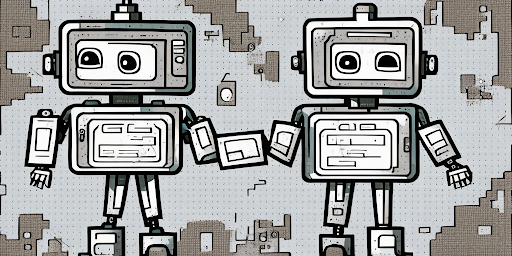OpenAI’s ‘Homework machine’ passes the bar

Used by permission by Gabe Schmit via Stable Diffusion v2.0
Help or harm? It’s hard to tell if AI can provide a learning benefit or looming danger.
March 27, 2023
We are one step closer to making Skynet a reality.
OpenAI, the company responsible for GPT-3, has just released GPT-4. The fourth revision in the series, GPT-4 is the direct descendant of GPT-3, a text-to-text neural network that powers ChatGPT, DALLE 2 and other influential applications. Users can pay $20 to access the premium features on ChatGPT, which includes scaling to handle 25,000 words per prompt, unlike GPT-3, which can only handle 3,000 words, with the tradeoff of creative originality for computing speed.
The primary concern currently surrounding machine learning and AI, in general, has only been emphasized in recent years due to the increasing complexity of text generation “learning” how to pass human-oriented benchmarks, such as standardized tests. GPT-4 can effectively pass the bar exam, with testing showing consistency around the 90th percentile; in addition, the reading & math SAT were easily performed by GPT-4, with its scores averaging from the 80th to 90th percentiles. Meanwhile, GPT-3 can only score on average in the 10th percentile on the bar, with work needed on other exams.
The power that GPT-4 holds has drawn many potential customers, eager to use the model to improve their app’s functionality. One such customer is Microsoft, which plans to integrate it into its new chat-powered search engine on Bing, which will use natural language to generate search queries to make the most effective search for the user. In addition, Microsoft plans to integrate the AI into their new Windows 11, the successor of Windows 10, in later releases. Other major buyers include money manager Morgan Stanley, language-learning app Duolingo and educational platform Khan Academy.
Despite the proficient successes GPT-4 has, it still is lacking in some areas. Most notably, its performance in computation time has increased, as do all models as size increases, due to needing to index larger sums of data every time. This also might contribute to reductions in toxic content that could potentially be generated when outputting text to users, which only adds to computation complexity and thus time.
With those concerned about AI taking your job, have no fear as the robot overlords around the corner. GPT-4 could soon replace you, for the small price of $20 and your favorite flavor of computing power.








